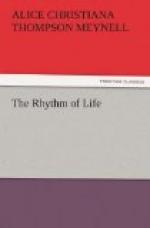DECIVILISED
The difficulty of dealing—in the course of any critical duty—with decivilised man lies in this: when you accuse him of vulgarity—sparing him no doubt the word—he defends himself against the charge of barbarism. Especially from new soil—transatlantic, colonial—he faces you, bronzed, with a half conviction of savagery, partly persuaded of his own youthfulness of race. He writes, and recites, poems about ranches and canyons; they are designed to betray the recklessness of his nature and to reveal the good that lurks in the lawless ways of a young society. He is there to explain himself, voluble, with a glossary for his own artless slang. But his colonialism is only provincialism very articulate. The new air does but make old decadences seem more stale; the young soil does but set into fresh conditions the ready-made, the uncostly, the refuse feeling of a race decivilising. American fancy played long this pattering part of youth. The New-Englander hastened to assure you with so self-denying a face he did not wear war-paint and feathers, that it became doubly difficult to communicate to him that you had suspected him of nothing wilder than a second-hand dress coat. And when it was a question not of rebuke, but of praise, the American was ill-content with the word of the judicious who lauded him for some delicate successes in continuing something of the literature of England, something of the art of France; he was more eager for the applause that stimulated him to write romances and to paint panoramic landscape, after brief training in academies of native inspiration. Even now English voices, with violent commonplace, are constantly calling upon America to begin—to begin, for the world is expectant. Whereas there is no beginning for her, but instead a continuity which only a constant care can guide into sustained refinement and can save from decivilisation.
But decivilised man is not peculiar to new soil. The English town, too, knows him in all his dailiness. In England, too, he has a literature, an art, a music, all his own—derived from many and various things of price. Trash, in the fulness of its in simplicity and cheapness, is impossible without a beautiful past. Its chief characteristic—which is futility, not failure—could not be achieved but by the long abuse, the rotatory reproduction, the quotidian disgrace, of the utterances of Art, especially the utterance by words. Gaiety, vigour, vitality, the organic quality, purity, simplicity, precision—all these are among the antecedents of trash. It is after them; it is also, alas, because of them. And nothing can be much sadder than such a proof of what may possibly be the failure of derivation.




